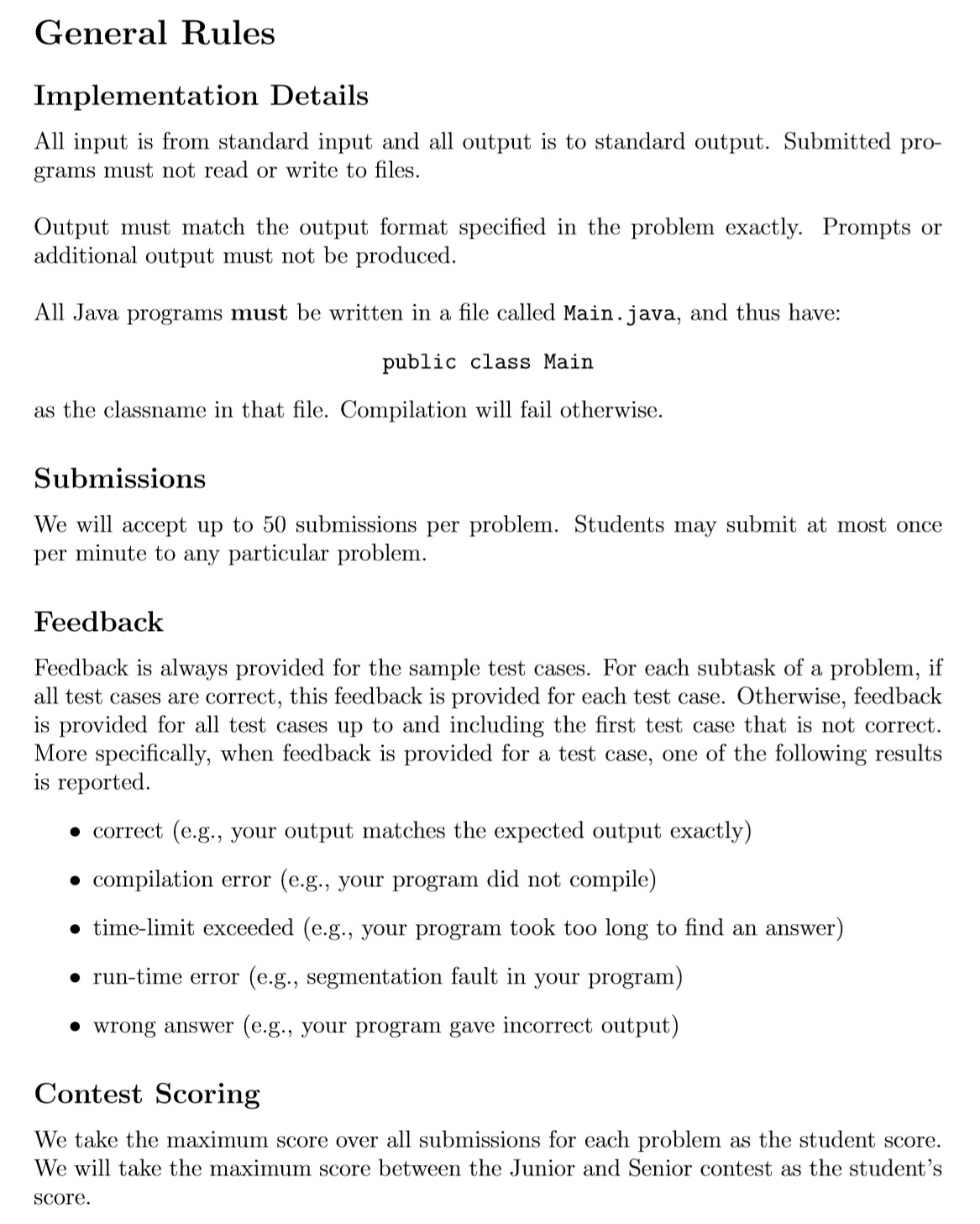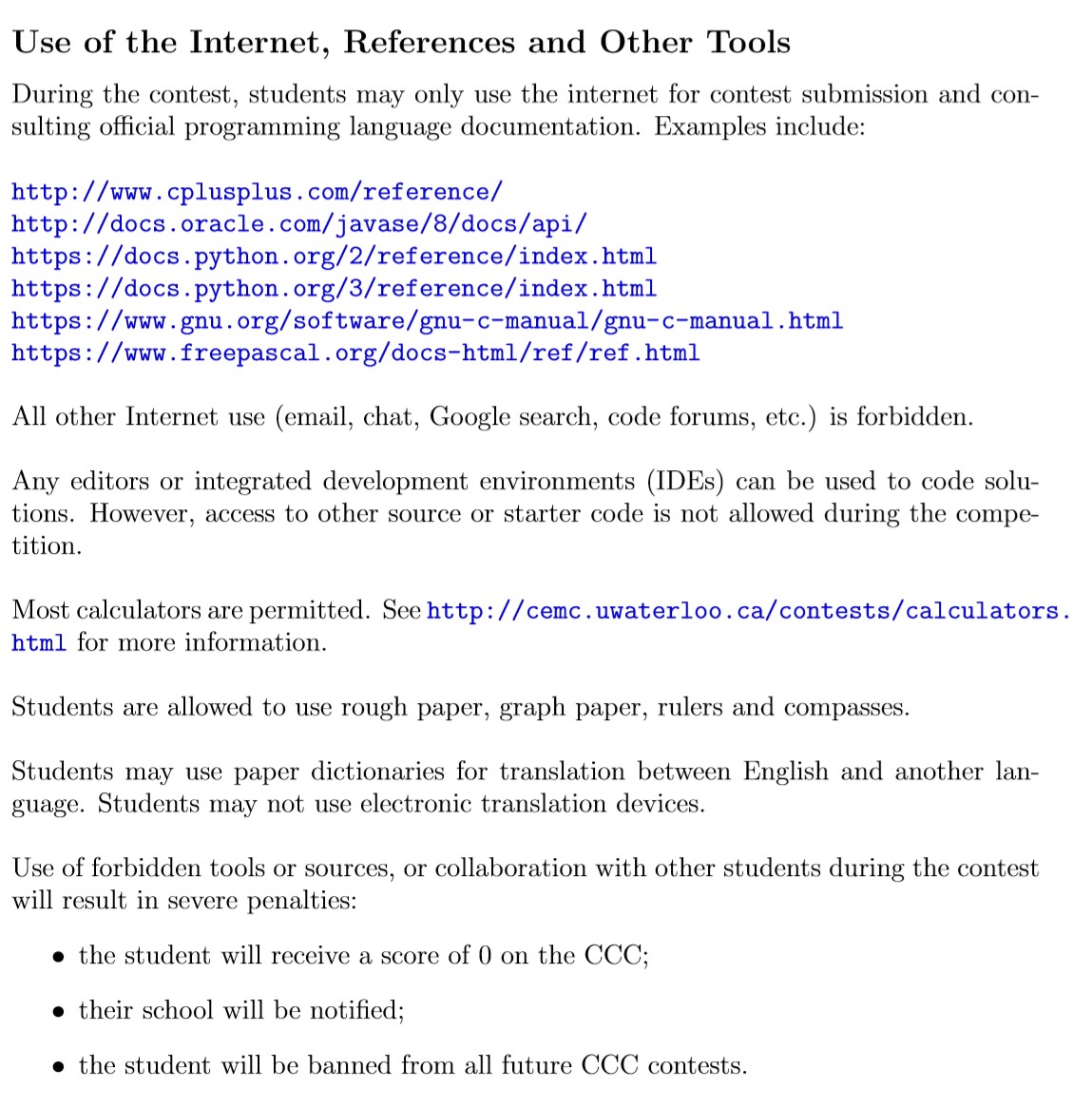Problem A: CCC 比赛规则(此题不要提交)
Time Limit: 1 Sec Memory Limit: 128 MBSubmit: 12 Solved: 3
[Submit] [Status] [Web Board] [Creator:]
Description


Input
示例程序:
# Canadian Computing Competition
# Example program to demonstrate input and output and time limit.
# Programming Language: Python 3.x
# Specification:
# Write a program that reads several positive integers, one per
# line. For each integer n, output the number of orderings
# possible for a set of n distinct values. n will not exceed 11.
# The last line of input is indicated by 0.
#
# Sample Input:
# 1
# 9
# 0
#
# Output for Sample Input:
# 1
# 362880
#
# Implementation:
#
# The answer is n! (n factorial) which is easily computed in n steps.
# But this program does it the hard way. It uses a recursive function
# to enumerate and count all the possible orderings.
#
# How to run the program:
#
# The program reads from "standard input" and writes to "standard output."
# Specifically, you can this program with input by typing at the
# DOS command prompt (yes, you will need a Command Prompt window)
# in the correct directory (where you created the test.py2 file):
# python test2.py < input.txt
# where input.txt contains the test data.
#
# Run-time:
#
# Please time the execution time of this program on your computer,
# using the sample input. This time is the maximum that should be
# allowed for any CCC program. Note that this solution will work
# only up to problems of size 9 in the required time limit
#
def countfact(s, n, total):
if (n == 0):
# uncomment to print out each ordering
#
# for j in range(total):
# print(s[j]," "),
# print()
return 1;
r = 0
for i in range(n):
t = s[i]
s[i] = s[n-1]
s[n-1] = t
r += countfact(s,n-1,total)
s[n-1] = s[i]
s[i] = t
return r
######################################
## start of main function
set = [0]*11;
# initialize the set of values
for i in range(11):
set[i] = i+1;
n = 1
while (n > 0): # 0 would do nothing, and -1 is nothing to read
n = int(input())
if (n>0):
print(countfact(set,n,n))
######################################################################
## For comparison, here is a slightly more efficient solution
##
##import itertools # allows importing of permutations
##
##n = 1
##while (n > 0): # 0 would do nothing, and -1 is nothing to read
## n = int(raw_input())
## if (n>0):
## all_permutations = list(itertools.permutations(range(n)))
## # uncomment to see all the permutations
## #
## #for perm in all_permutations:
## # print(perm)
##
## print(len(all_permutations))
##
# Canadian Computing Competition
# Example program to demonstrate input and output and time limit.
# Programming Language: Python 3.x
# Specification:
# Write a program that reads several positive integers, one per
# line. For each integer n, output the number of orderings
# possible for a set of n distinct values. n will not exceed 11.
# The last line of input is indicated by 0.
#
# Sample Input:
# 1
# 9
# 0
#
# Output for Sample Input:
# 1
# 362880
#
# Implementation:
#
# The answer is n! (n factorial) which is easily computed in n steps.
# But this program does it the hard way. It uses a recursive function
# to enumerate and count all the possible orderings.
#
# How to run the program:
#
# The program reads from "standard input" and writes to "standard output."
# Specifically, you can this program with input by typing at the
# DOS command prompt (yes, you will need a Command Prompt window)
# in the correct directory (where you created the test.py2 file):
# python test2.py < input.txt
# where input.txt contains the test data.
#
# Run-time:
#
# Please time the execution time of this program on your computer,
# using the sample input. This time is the maximum that should be
# allowed for any CCC program. Note that this solution will work
# only up to problems of size 9 in the required time limit
#
def countfact(s, n, total):
if (n == 0):
# uncomment to print out each ordering
#
# for j in range(total):
# print(s[j]," "),
# print()
return 1;
r = 0
for i in range(n):
t = s[i]
s[i] = s[n-1]
s[n-1] = t
r += countfact(s,n-1,total)
s[n-1] = s[i]
s[i] = t
return r
######################################
## start of main function
set = [0]*11;
# initialize the set of values
for i in range(11):
set[i] = i+1;
n = 1
while (n > 0): # 0 would do nothing, and -1 is nothing to read
n = int(input())
if (n>0):
print(countfact(set,n,n))
######################################################################
## For comparison, here is a slightly more efficient solution
##
##import itertools # allows importing of permutations
##
##n = 1
##while (n > 0): # 0 would do nothing, and -1 is nothing to read
## n = int(raw_input())
## if (n>0):
## all_permutations = list(itertools.permutations(range(n)))
## # uncomment to see all the permutations
## #
## #for perm in all_permutations:
## # print(perm)
##
## print(len(all_permutations))
##
Output
The Canadian Computing Competition (CCC) began in 1996 as a forum for high school students in Canada to learn about and enjoy aspects of programming.
Top Senior contestants from the CCC are invited to attend the Canadian Computing Olympiad (CCO).
The Competitions
The CCC is written in schools using the CCC Online Grader. This is a 3 hour contest composed of 5 questions (either at the Junior or Senior Level).
Teachers need to register in order for contests to be written in schools. There is no team competition.
HINT
此题为比赛规则说明,不要提交